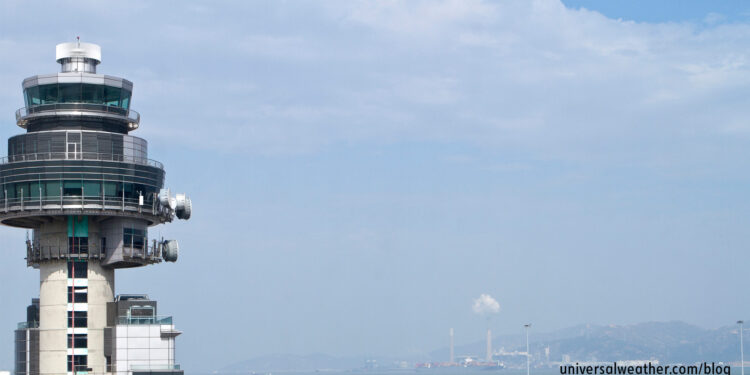Business Aviation Trip Planning Tips: Operating to Hong Kong

For business aviation operators traveling to Hong Kong (VHHH), advanced planning is required, as well as knowledge of the operational challenges such as limited aircraft parking availability in the area. VHHH is a 24-hour airport with no curfews, and documentation requirements are very stringent, so it’s always best to review requirements in advance with your 3rd-party provider or ground handler.
The following is an overview of what you need to know:
1. Be aware of permit considerations
Private non-revenue and charter (non-scheduled commercial) operations to VHHH require landing permits, airport slots, and Prior Permission Required (PPR). Be aware that VHHH Civil Aviation Authority (CAA) requires extensive paperwork and is very particular on documentation requirements. The most common documentation issues operators run into at VHHH have to do with insurance requirements. CAA is looking for specific verbiage – including coverage and 3rd-party liability – on policies. If insurance coverage is beneath minimum specifications, your landing permit will be rejected. Stage 2 aircraft are banned from VHHH, and all aircraft must have a certificate onboard confirming Stage 3 compliance. If an aircraft has been hush-kitted to Stage 3, with correct documentation, it will be accepted.
2. Know common documentation issues
One of the most common documentation issues we come across is lack of monetary units – such as USD or SDR – on coverage amounts. Another common issue is operator name not matching the name on the insurance policy. Always provide some sort of document linking operator name with the entity named in the policy. If the owner of the aircraft is different from the operator, ensure that both names are on the insurance. Charter flights must provide statements that crew are familiar with airport procedures into/out of the field.
3. Consider permit lead times
The minimum permit lead time requirement for both private non-revenue and charter operations is three business days, considering that all paperwork is in order. However, it’s recommended to allow additional time in case documentation needs to be corrected. Assuming that all required documentation is supplied, permits can be turned around more quickly – at CAA’s discretion. VHHH CAA website contains all permit documentation requirements.
4. PPRs and airport slots are needed
PPR requirements for VHHH became effective February 15, 2013. Prior to landing, all operators to VHHH must have a confirmed parking stand. PPR may be requested via Hong Kong airport authority up to 30 days in advance of the Estimated Time of Arrival (ETA), with a minimum lead time of 72 hours. If parking is denied, the only option will be a drop and go. For stops of six hours or less, a PPR is automatically approved.
5. Parking alternates are available if VHHH is full
Alternates to consider when VHHH has no overnight parking include Clark Intl (RPLC) and Subic Bay Intl (RPLB) in the Philippines. They are 580 and 600 nautical miles (NM) away, respectively. Both airfields have plenty of aircraft parking. Macau (VMMC) may also be considered as an alternate, but be aware that landing permits are necessary for all of these alternatives. Mainland China may also be considered as a parking alternate, but you’ll need a landing permit and a sponsor letter to land there.
6. Overnight parking is becoming an issue at VHHH
Due to increasing airport activity, General Aviation (GA) aircraft are turned away on a regular basis at VHHH for overnight parking. GA aircraft are routinely parked on the commercial side of the field these days, but this has been causing issues with scheduled airline operators. Currently, there seems to be no room available for expansion of GA parking options.
7. Airport slots can also be an issue
It’s always best to request airport slots well in advance – via the airport slot coordinator – as slots are limited, particularly during holidays such as Lunar New Year, Christmas, and Easter. Slots must be requested in General Aviation Clearance Request (GCR) format as no other request formats are accepted. Best practice is to request slots 10-15 days prior to ETA. If slots are requested too far in advance, however, the slot coordinator may not respond to your request. Slot deviation at VHHH is +/- 20 min. If you operate outside this deviation, the slot coordinator may ask for an explanation.
8. Plan fuel uplifts in advance
GA fuel uplifts at VHHH must be done by one of two Fixed-Base Operator (FBO) fuel trucks. One truck holds 18,000 liters while the other holds 16,000 liters, and it takes time for these trucks to refuel from the fuel farm. Be aware that GA may not use hydrant fuel or the fuel trucks on the commercial side at VHHH. Fueling on arrival is one means of avoiding departure delays. Otherwise, let your ground handler know in advance how much fuel you require and reconfirm the day prior to fuel uplift. Depending on traffic and movements, fueling delays of up to one hour may occur.
9. Consider arrival/departure procedures
Be aware that departure delays are relatively common during busier periods. Peak arrival hours are 1500-1700 local, while peak departure hours are 0800-0930 local. There are two runways at VHHH – one for departure and the other for arrival. There’s only one departure point, and air traffic control lines up all aircraft together. Be mindful that if your flight departs late – due to a late passenger, etc. – you may face an additional delay of 30-45 minutes due to FBO traffic congestion. It’s also important to note that Customs, Immigration, and Quarantine is cleared at the FBO, with typical processing time of 5-10 minutes. With only two immigration officers at the FBO, larger groups will take longer to clear.
10. Most parking spots are self-taxi
Most parking spaces at the FBO are self-taxi in/out. If FBO parking ramp is full, aircraft will be towed to remote parking and, on day of departure, towed back to the FBO. It’s best to be at the airport at least two hours prior to departure to ensure the FBO has all documentation ready for departure, customs, and fuel, along with flight plan and weather packages. Crews arriving 40 minutes prior to departure may experience delays resulting in late departures.
11. Book hotel rooms in advance
When large local events take place, Hong Kong hotel availability becomes limited. There have been situations where crew rooms have cost over 1,000 USD per night. So, it’s always best to confirm accommodation options and cancellation policies well in advance.
Conclusion
Be proactive when operating to VHHH. Landing permits, airport slots, and PPRs should be organized well in advance of the ETA. Requests for services, fuel uplifts, and hotel accommodations should also be requested, and confirmed, as early as possible.
Questions?
If you have any questions about this article or would like assistance planning your next trip to Hong Kong, contact Alan Pong at alanpong@univ-wea.com.




